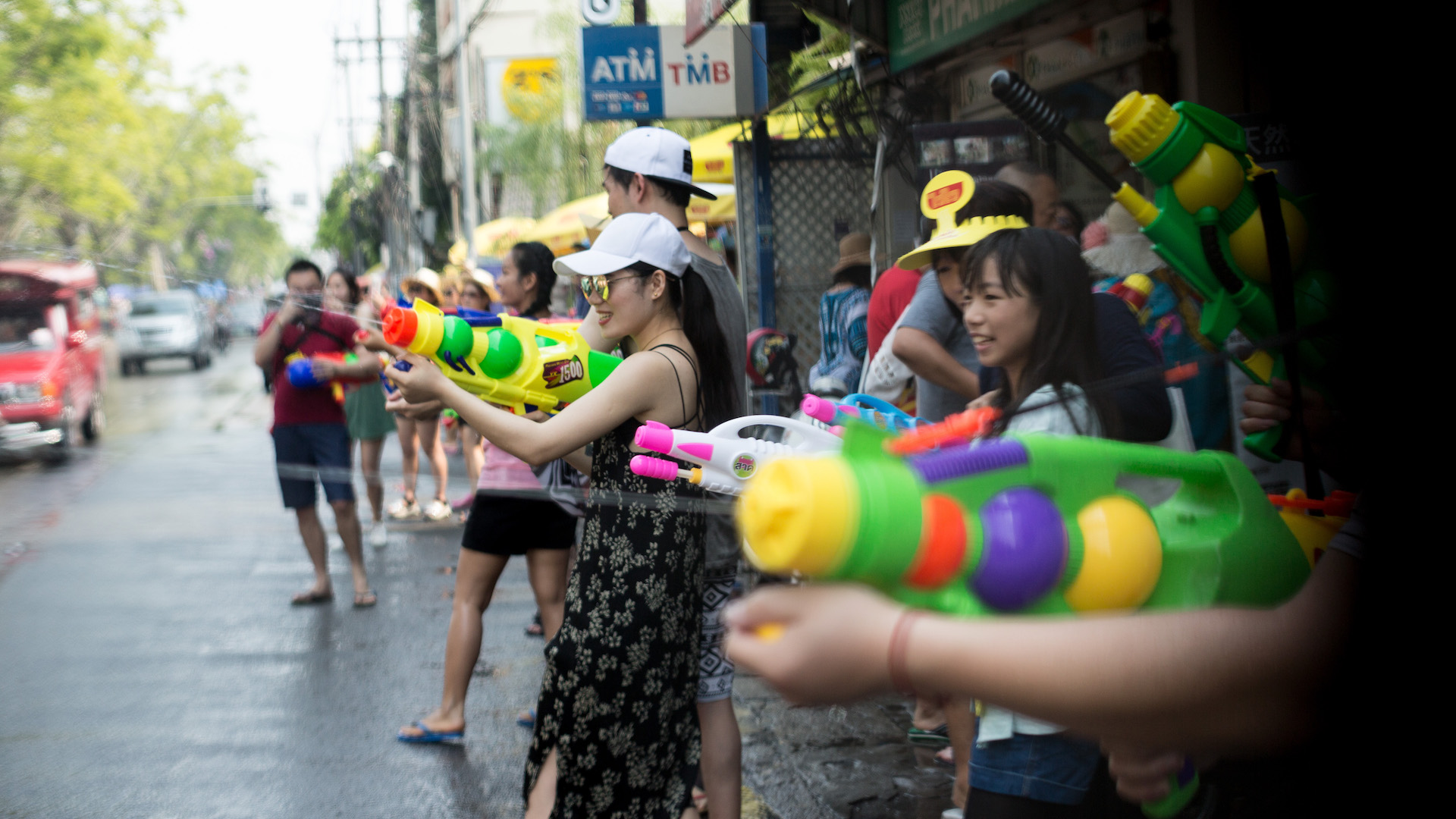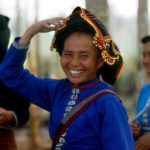
In Northern Thailand, in the city of Chiang Mai, the Songkran festival has become one of the largest water fights in Southeast Asia. The moat that surrounds the ancient, inner city gates becomes the center of a city-wide party. People load up in pickup trucks and drive slowly around the moat, dumping buckets of water on those stationed along the moat and nearby. Meanwhile, those on the ground wield large barrels of water and spray passersby with water hoses and oversized water guns.
In the capital city of Bangkok, streets are full of people celebrating Songkran. It’s a party on a grand scale, with music, water, food and drink, that can last up to a week.
In Thailand the holiday is called Songkran (song-krän), and in Laos it’s called Pi Mai (bee-my), which literally means “New Year.” Buddhists in Thailand, Laos, Cambodia, and Myanmar celebrate the lunar new year with so much fervor that people come from around the world to experience this incredible festival.
Songkran typically falls in the middle of April every year, during the hottest season in tropical Southeast Asia. Songkran is a time to “throw water,” as locals call it.
Throwing Water for Merit
Revelry isn’t the only feature of the holiday. Songkran is also known for its reverence and reflection in Buddhist tradition. Temples in Thailand and Laos set up sand stupas where followers can light incense and candles and post Buddhist banners that ask for good luck and prosperity. Participants pour cups of water over Buddha images to atone for sins and attain merit. Families gather together and the younger generation asks for blessings from their elders. Birds are bought in small bamboo cages and then set free to demonstrate the release of sins.
“The spirits Southeast Asians seek to appease and the Buddha they hope to emulate are too distant to make a lasting impact on their lives.”
Some Buddhist devotees even shave their heads and enter the temple for a time of purification and meditation after the Songkran festivities die down. The Thai and Lao people know they need repentance and cleansing from sins. They face an ongoing battle in the Buddhist system to increase their good deeds so that they outweigh their bad ones.
The Living Water That Washes Away Sin And Karma
This is where the good news of the gospel gives incredible hope. The cleansing from sin and the need for constant repentance is done away with through Jesus’ sacrifice on the cross and resurrection from the grave. “But he has appeared once for all at the culmination of the ages to do away with sin by the sacrifice of himself” (Heb. 9:26 NIV). The victory over sin and death is won. There is real hope for a new life and an everlasting peace through Jesus.
The Buddhists of Thailand and Laos need to hear this good news. They live in a constant state of trying to appease evil spirits and increase their good karma. They instinctively acknowledge that enlightenment—nirvana—is impossible to reach, so they set their sights on the hope of a better life in their next round of reincarnation.
Theravada Buddhism teaches that each person is responsible for their own karma, fate or destiny. To accept any kind of benevolent covering of sins, especially from an unknown person or source, is unacceptable and even offensive in this culture. The concept of a personal and loving being that created the world and has an interest in relating to each individual is outlandish and absurd. Buddhists believe God is so far above humans in the spiritual realm that to bring him closer to us diminishes any divinity or power he may hold.
Songkran and Gospel Opportunity
Despite the worldview barriers Christians face as they try to share the good news with Southeast Asians, Songkran offers opportunities to share living water. Southeast Asian people feel the weight of their humanity. They long for unconditional love and acceptance in a culture that teaches they must accept their fate both in this life and the next. The spirits they seek to appease and the Buddha they hope to emulate are too distant to make a lasting impact on their lives. Sharing a personal testimony and showing the love of Christ in action goes a long way toward opening a door to share the truth of the gospel with Thai or Lao Buddhists.
The love of Father God who gave up his only Son unto death to atone for sins of strangers is powerful. This is the real living, cleansing water people are craving during the Songkran Festival. Instead of “throwing water,” or pouring it on the Buddha, let Jesus’s cup of living water come to the Thai and Lao people. Rather than water that washes away sins for the season, they need living water that springs up from within, welling up to eternal life (John 4:10, 13).
Join Us in Prayer for Southeast Asian Buddhists
- Pray that Southeast Asian Buddhists would become disillusioned with their current practices of merit-making and long for a way out of the cycle of reincarnation.
- Pray that Christians would be bold witnesses and share the living water of the gospel during Songkran.
- Pray that the spiritual eyes of the Southeast Asian Buddhists would be opened and their hearts would receive the gospel.


